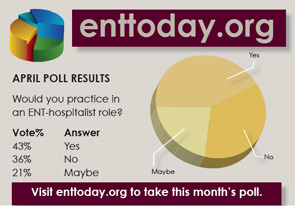Regarding the article, “Otolaryngologist Pioneers New Practice Model: Dr. Russell heralds hospitalist role as others ponder the concept’s staying power”…


Regarding the article, “Otolaryngologist Pioneers New Practice Model: Dr. Russell heralds hospitalist role as others ponder the concept’s staying power”…
I read with great interest the article published in the December 2010 issue of ENT Today, “Safety Net: With violence on the rise, otolaryngologists implement prevention strategies”. Physician safety in the workplace is still largely ignored and your article serves to further awareness of the problem. I thank you for providing this forum.
September’s Poll Results
Dr. Sims has eloquently identified the value of diversity not only in otolaryngology, but also its contribution to the strength of the U.S. as a nation. Drs. Kuppersmith and Thomas have responded to his editorial indicating steps that the AAO-HNS has taken and is currently taking to increase diversity.
My Viewpoint was intended to call attention to a problem and inspire us to act with more alacrity.
We read with great interest Dr. Steven Sim’s recent op-ed, “More of the Same: Why isn’t otolaryngology becoming more diverse?” in ENT Today (Viewpoint, Sept. 2010).
As America grows and evolves, its face necessarily changes. Our country rests solidly on the idea that life, liberty and the pursuit of happiness should be available to all. Our collective understanding that access to health care and healthy living are essential to that ideal happiness continues to mature. But while the population becomes more diverse and blended, cultural disparities in health care not only persist, they do not appear to be diminishing. Collectively, African-Americans, Hispanic Americans and Native Americans comprise over one-quarter of our population. Yet, in the year 2000, they made up less than 10 percent of the physician workforce. These numbers dwindle even more when we consider surgical subspecialties.
I have been a strong advocate of electronic medical records (EMRs) for almost a decade. In fact, I used the phrases “It is the silver bullet for health care reform infrastructure” and “It is the cornerstone for health care reform infrastructure” to describe EMR plans when President Obama was campaigning. However, technology, like fire, can warm your house or burn it down, cook your food or kill you. Likewise, the wrong EMR will escalate inefficiency and raise health care costs. The wrong mandates or the wrong incentives have the potential to paralyze the day-to-day practice of medicine.

This issue of ENT Today includes an article on the debate over canal-wall-up (CWU) versus canal-wall-down (CWD) tympanomastoidectomy (p. 5). I remember hearing the same arguments when I was a resident at UCLA, which was also the last time I drilled a mastoid bone; my practice focused on head and neck surgery and pediatric otolaryngology. Over the past 32 years, Drs. Bruce Gantz, Rick Chole (two of my otology colleagues on the Board of Otolaryngology), and other otologist friends have suffered through my semi-tongue-in-cheek comments on why otologists can’t agree on which procedure is better. Although the technology used in both procedures has evolved, the final product of the two procedures, a dry, safe ear, is, as best I can tell, the same as it was when I was a resident. I have been told that one of the main factors considered in the decision regarding which procedure to perform is where the otologist trained.

Performing international surgical outreach missions to help the world’s most disadvantaged patients overcome the disability imposed by disease is an extremely rewarding experience. Missions are challenging, varying in their length, level of working and living conditions and the surgery performed. Despite the rigors of mission work, there has not been a mission where members of the medical team did not find the experience to be life changing.